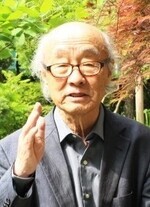hankyoreh
Links to other country sites 다른 나라 사이트 링크
[Column] Two Koreas should respond to Fukushima water issue together

By Park Han-shik, Professor Emeritus of international affairs at the University of Georgia
The Japanese government announced on April 13 its decision to dump into the ocean radioactive water currently stored in tanks at its Fukushima Daiichi Nuclear Power Plant. Japan made official its plans to release the contaminated water in the face of considerable concerns and opposition from inside Japan and its neighbors and the international community.
This decision is mistaken and should be immediately withdrawn. It's deplorable that such a decision could be made by Japan, a country that ought to be particularly cautious about nuclear power and radioactivity given its direct experience of the awful consequences of an atomic attack and subsequent radiation exposure.
The South Korean government's response has been tepid, but fortunately civic groups, students and the fishing industry have held big demonstrations to denounce the Japanese government's decision to release the contaminated water.
Doubts remain about whether the contaminated water would be safe even after several rounds of purification. Once in the ocean, the water can't be blocked by national borders, and it will surely pollute the environment and degrade the maritime ecosystem.
Since nuclear power provides 15 percent of the world's energy, there's always a risk of a radiation leak occurring at one of the world's many nuclear power plants. If Japan is allowed to release the contaminated water, it will set a bad international precedent for similar incidents that occur down the road.
The US and the International Atomic Energy Agency are overtly backing Japan with their public support of its decision to release the contaminated water from Fukushima.
The US deserves criticism for its highly hypocritical attitude. The US Food and Drug Administration banned seafood harvested in or near Fukushima following the nuclear accident there in March 2011, a ban that remains in place today.
In effect, the Biden administration's two-faced attitude of support for Japan's release of contaminated water that will spread radioactive material around the world makes it an accomplice with Japan. This is the same administration that has struck a pro-environmental stance, rejoining the Paris Agreement for climate on Biden's first day in office and organizing a "climate summit" for world leaders last month.
The US appears to be siding with Japan on this issue because of the growing importance of Japan's cooperation in countering and containing China. But the US remains vulnerable to criticism about disregarding the universal human value of environmental protection for political ends.
Given the emphasis that the Biden administration has placed on restoring the US's global leadership, its use of a double standard here will seriously weaken the US's moral authority and leadership in the international community.
The South Korean government should respond to Japan's decision to release the contaminated water by cooperating with North Korea to bring this issue to the international community's attention. It's true that hardly any inter-Korean dialogue or cooperation is underway at the moment, but I hope that Japan's decision can serve as a chance to renew such initiatives.
As it happens, North Korea's state-run Rodong Sinmun described Japan's plan to release the contaminated water as a "rash and inhumane act" and called on Japan to withdraw that plan. That suggests it might not be so difficult for Seoul and Pyongyang to cooperate on this issue.
What's needed is a diplomatic campaign in which Koreans make a unified appeal to the international community. South and North Koreans could carry out joint research on maritime pollution, and the South and North Korean governments could issue a joint recommendation or resolution condemning Japan's behavior and calling on it to reverse its decision.
Please direct comments or questions to [english@hani.co.kr]

Editorial・opinion
![[Editorial] Penalties for airing allegations against Korea’s first lady endanger free press [Editorial] Penalties for airing allegations against Korea’s first lady endanger free press](https://flexible.img.hani.co.kr/flexible/normal/500/300/imgdb/original/2024/0502/1817146398095106.jpg) [Editorial] Penalties for airing allegations against Korea’s first lady endanger free press
[Editorial] Penalties for airing allegations against Korea’s first lady endanger free press![[Editorial] Yoon must halt procurement of SM-3 interceptor missiles [Editorial] Yoon must halt procurement of SM-3 interceptor missiles](https://flexible.img.hani.co.kr/flexible/normal/500/300/imgdb/child/2024/0501/17145495551605_1717145495195344.jpg) [Editorial] Yoon must halt procurement of SM-3 interceptor missiles
[Editorial] Yoon must halt procurement of SM-3 interceptor missiles- [Guest essay] Maybe Korea’s rapid population decline is an opportunity, not a crisis
- [Column] Can Yoon steer diplomacy with Russia, China back on track?
- [Column] Season 2 of special prosecutor probe may be coming to Korea soon
- [Column] Park Geun-hye déjà vu in Yoon Suk-yeol
- [Editorial] New weight of N. Korea’s nuclear threats makes dialogue all the more urgent
- [Guest essay] The real reason Korea’s new right wants to dub Rhee a founding father
- [Column] ‘Choson’: Is it time we start referring to N. Korea in its own terms?
- [Editorial] Japan’s rewriting of history with Korea has gone too far
Most viewed articles
- 1Months and months of overdue wages are pushing migrant workers in Korea into debt
- 2Trump asks why US would defend Korea, hints at hiking Seoul’s defense cost burden
- 31 in 3 S. Korean security experts support nuclear armament, CSIS finds
- 4[Editorial] Yoon must halt procurement of SM-3 interceptor missiles
- 5[Guest essay] Maybe Korea’s rapid population decline is an opportunity, not a crisis
- 6Fruitless Yoon-Lee summit inflames partisan tensions in Korea
- 7[Column] Can Yoon steer diplomacy with Russia, China back on track?
- 8At heart of West’s handwringing over Chinese ‘overcapacity,’ a battle to lead key future industries
- 9South Korea officially an aged society just 17 years after becoming aging society
- 10Under conservative chief, Korea’s TRC brands teenage wartime massacre victims as traitors